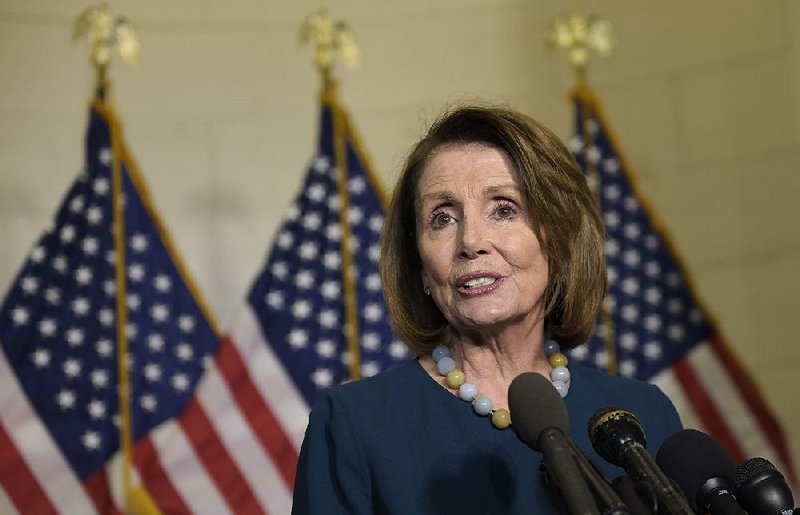WASHINGTON -- Rep. Nancy Pelosi of California beat back a challenge Wednesday from a fellow Democrat who said the party had lost its connection to the U.S. working class, quashing anxious calls for a change in the House leadership she has directed for 14 years.
Her victory over Rep. Tim Ryan, a 43-year-old congressman from a blue-collar district anchored in Youngstown, Ohio, ensures that the party will be led in the next Congress by the established "coastal" Democrats who have increasingly defined it -- Pelosi, 76, who represents San Francisco, and Sen. Charles Schumer of New York, 66, who has held various leadership posts since 2005. The vote for Pelosi was 134-63.
"I have a special spring in my step today because this opportunity is a special one, to lead the House Democrats, bring everyone together as we go forward," Pelosi said after the vote.
She disputed the suggestion that she might be concerned about the defections she suffered. "They weren't defections, I had two-thirds of the vote," Pelosi said, repeating "two-thirds, two-thirds" to a group of assembled reporters.
And she insisted Democrats would rebound. "We know how to win elections. We've done it in the past, we will do it again."
Ryan got the support of about a third of the House Democrats -- a significant move away from Pelosi, who has had few challenges to her in the past. In 2010, the last time she was opposed, she lost just 43 votes.
Though they came up well short, Ryan and his band of supporters declared a symbolic victory in prompting Pelosi to make a series of proposals to elevate junior lawmakers and lead a more inclusive leadership table. They also declared that the party's economic agenda, at times ignored by their presidential nominee, Hillary Clinton, and other Democrats, would move to the front and center to appeal across the country alongside the cultural issues that dominated the campaign.
"We're going to win as Democrats if we have an economic message that resonates in every part of the country," Ryan told reporters after his defeat. "We are disappointed because I like to win. ... But the party is better off," he added.
[EMAIL UPDATES: Sign up for free breaking email alerts and other Democrat-Gazette daily news updates]
An hour later, Pelosi appeared and publicly congratulated Ryan on running a good race. But, she said, "I think we're at a time that is well beyond politics. It's about the character of America."
Pelosi tried to placate some of the angst among junior lawmakers by offering a series of new or modified positions, including the new position of "vice-ranking member" on the more than 20 standing House committees and reserving it for lawmakers who served four terms or less. A policy-leadership position would be divided into three co-chairmen and reserved for those who have served five terms or less.
"It is obvious that the current strategy doesn't work; millions of Americans don't feel that our party represents them anymore and they've said so, loudly, in multiple elections," Rep. Kyrsten Sinema, D-Ariz., said in a Twitter post.
Democrats also re-elected Rep. Steny Hoyer, 77, of Maryland as whip, the No. 2 position, as well as Rep. James Clyburn, 76, of South Carolina, in the No. 3 spot as the assistant Democratic leader. Hoyer and Clyburn have been part of the Democratic leadership team since 2003 and 2007, respectively.
After the Democrats gained just six seats in the November elections, the fight for Pelosi's post had become a proxy battle for the future of the party, with House Democrats agonizing over how to reconnect with the working-class voters who abandoned them.
Although he collected just a dozen or so public endorsements, Ryan mounted an unlikely challenge to Pelosi, long considered a legislative and fundraising powerhouse. Driven by the conviction that Democrats need a new leader, he tried to harness discontent with a leadership team that has failed three times to reclaim the majority since being swept out in 2010.
Rep. Beto O'Rourke, D-Texas, credited Ryan's challenge with forcing Pelosi to take the unrest among colleagues more seriously.
"That's partly a response to the competition in the caucus for votes, and that's a healthy thing," he said.
Others remain upset at Pelosi's control of the House campaign arm, the Democratic Congressional Campaign Committee. She has proposed leaving Rep. Ben Ray Lujan, D-N.M., as committee chairman for another term despite 2016 elections that saw just the six-seat gain after Pelosi personally predicted a gain of more than 20 seats.
"We should have been recruiting earlier, we should have better targeting. I think our messaging was off," Rep. Ruben Gallego, D-Ariz., said in an interview on Tuesday. "I think we are focused so much still on TV instead of looking at new methods of communications and/or even old methods of communication -- canvassing and digital buys."
A 37-year old former Marine corporal, Gallego was especially critical of what he considered the campaign committee's staff members' work trying to please Pelosi, calling them "bureaucratic in nature."
Some Democrats want the position to be contested rather than be a rubber stamp of whomever top Democrats select.
Pelosi's backers reminded detractors that House Democrats are now in a "comeback situation" without a Democratic president in office -- a dynamic similar to 2000 when Bush took office after a fiercely partisan, closely contested election. Over six years, Pelosi served as Bush's main partisan foil and ultimately led a campaign that regained House control.
Leadership elections were originally scheduled to be held before Thanksgiving but were delayed to give Democrats more time to consider a path forward. Lawmakers expressed frustration over a range of issues, including stagnant leadership in their caucus, and Democrats' failures to connect with white, working-class voters.
"I'm very concerned we just signed the Democratic party's death certificate ... unless we change what we are talking about, which is really the working man and woman's agenda," said Rep. Kurt Schrader of Oregon.
Pelosi has earned respect and loyalty from many Democrats over the years, including as a fundraiser, raising over $140 million for Democrats in the 2016 cycle, and as a skilled legislative tactician. As speaker in 2009 she steered Obama's health care law through the House and also pushed through a divisive bill to cap carbon emissions, but Democrats suffered widespread losses in midterm elections the next year and lost their majority.
Information for this article was contributed by Emmarie Huetteman of The New York Times; by Paul Kane, Ed O'Keefe and Mike DeBonis of The Washington Post; and by Erica Werner, Matthew Daly and Mary Clare Jalonick of The Associated Press.
A Section on 12/01/2016

